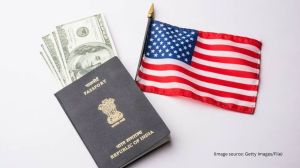BJP must seize the day
South East Asia's currency crisis has revived our fears about liberalisation and globalisation. The elections have added to the confusion as...

South East Asia’s currency crisis has revived our fears about liberalisation and globalisation. The elections have added to the confusion as rival formations indulge in competitive economic nationalism. Life would have been simple if we could reduce our economic policy to posing swadeshi against videshi. Unfortunately we live in a rapidly integrating and more complex world. A failure by the new government to come to terms with the global economy will condemn India to be a second-rate power.
We often deny unpleasant facts. For years we pretended not to see that the `permit-license raj’ was bleeding the economy. It took a crisis for remedial measures to be initiated. With the collapse of the export-oriented Tiger Economies, we are again faced with difficult choices. How will we respond to the tidal wave of globalisation? Will we withdraw in xenophobic fear or march forward to meet the challenges on our own terms? The answer must be sought in history, in economics, in politics and in culture.
True, India’simmediate history is a cautionary tale about engaging in trade. The East India Company, it has been well said, came to trade and remained to rule. Globalisation’s critics often invoke the spectre of neocolonialism to resist global integration. In fact, the edifice of India’s inward-looking tariff regime is the product of a mindset conditioned by the colonial experience. We are yet to come to terms with that experience with a degree of confidence. We are afraid that history will repeat itself and we will be enslaved. But history seldom repeats itself in such neat parallels. We need not fear engagement. It is more important to internalise the lessons of our colonial experience. We must understand that it was India’s economic backwardness, internal divisions and the lack of a unified leadership that betrayed us. What should worry us is that these devils are still with us.
The twin process of globalisation of the economy and the regionalisation of politics will pose serious challenges to our federal polity inthe emerging coalition politics. In Europe the Common Market is permitting previously non-viable economic entities such as Wales and Scotland to demand more political and economic freedom from London. A supra-national market is thus dissolving the fabric of traditional nation states.
How would a rapidly integrating global economy impinge on India’s federal polity? The coastal states of Maharashtra, Gujarat, Karnataka, Andhra Pradesh and Tamil Nadu have been quick to seize the opportunities offered by the new policy regime. A recent study indicated that they have cornered over 60 per cent of total foreign investment. But Kerala and a number of states in northern and eastern India have lagged behind. Some of the more advanced states are governed by parties with a distinct regional identity such as the DMK in Tamil Nadu and the Telugu Desam in Andhra Pradesh. If these states feel that globalisation and liberalisation will better their prospects then they will press for reforms. The states which have been leftout and which are ruled by entirely different political formations will oppose further opening up. Finding an acceptable mechanism for dealing with these conflicts without endangering national security, economic sovereignty and pluralistic civil society is one of our greatest challenges.
Economic policy is our third area of concern. In this election the new policy regime has not yet become a contentious issue. This is because ideological differences between rival formations are less sharp than is generally perceived. The apparent congruity of interest between the secular Left and the ultranationalist Right on globalisation is a case in point. Both have opposed if for identical reasons, namely, to protect the entrenched economic interests of powerful interest groups. While the Right champions the cause of companies unprepared to face global competition, the Left articulates the unease of trade unions.
Economies with a long, stable policy regime will in time be dominated by powerful interest groups. Theywill be more interested in safeguarding their relative share in the economy than in implementing efficiency-promoting policies. Those who benefited from the earlier policy regime will oppose any policy which undermines their economic interests. Interest-group clashes rather than ideological battles will set the agenda in the coming years.
Initially, globalisation poses fundamental questions about our national identity, about the very essence of “Indianess”. History teaches us that economic and political uncertainties often create powerful cultural backlashes. The economic and political collapse of the Weimar Republic created National Socialism in Germany. This ideology virtually robbed millions of Germans of their national identity on the basis of race. I do not think this can happen in India, but it is wise to be forewarned about the dangers ahead for there are some who hark back to a supposedly golden age in Indian history. For them identity is a product of a shared religion — an inward lookingdelineation of “Indianess” that excludes, by definition, large sections of Indians.
Posited against this is the Nehruvian vision of India as a pluralist society bound by a common past and a shared vision of the future. For Nehru central planning, secularism and democracy formed the crucible in which the Kashmiri, the Tamilian, the Naga and the Punjabi dissolved their separate regional and religious identities to forge a new pan-Indian identity. This was to be created through the instrumentality of the state — by the state dominating the economy, politics and society. Fifty years on, as Sunil Khilnani recently argued, this pan-Indian identity is fragmenting into three cultural segments: a small but powerful anglicised metropolitan elite, a Hindi-speaking population and the vernacular culture. What further mutation will the Indian identity undergo as globalisation and liberalisation inevitably widen economic disparities between regions and class?
The fault lines that could develop as the Indian economyintegrates more rapidly with the world are clear. But we do not have the choice of turning back on the world. Japan and China, which had very inward-looking cultures, were forced in the 19th century to deal with the West on disadvantageous terms. Today we have the potential to engage in international trade and commerce on less unilateral terms. We need the courage and vision to seize the opportunity. This is what the new government must display.
The writer is chairman of the Kerala State Electricity Board
Photos




- 01
- 02
- 03
- 04
- 05



























